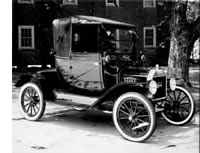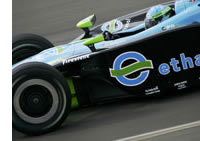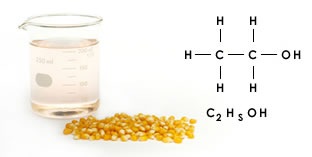Back To Chemicals
Page <<




With high gas prices making
alternative fuels increasingly attractive, no alternative fuel
has received as much attention as ethanol, highly prized
because it is renewable, domestically produced, and burns
cleaner than gas with a higher octane rating.
A Man Ahead of His Time
 Way
back in 1916, Henry Ford said in a magazine interview,
"Gasoline is going - alcohol is coming. It's coming to stay,
too, for it's in unlimited supply. And we might as well get
ready for it now. All the world is waiting for a substitute to
gasoline. When that is gone, there will be no more gasoline,
and long before that time, the price of gasoline will have
risen to a point where it will be too expensive to burn as a
motor fuel. The day is not far distant when, for every one of
those barrels of gasoline, a barrel of alcohol must be
substituted." Ford was definitely a man ahead of his time. He
was even ahead of our time, but we're beginning to catch on. Way
back in 1916, Henry Ford said in a magazine interview,
"Gasoline is going - alcohol is coming. It's coming to stay,
too, for it's in unlimited supply. And we might as well get
ready for it now. All the world is waiting for a substitute to
gasoline. When that is gone, there will be no more gasoline,
and long before that time, the price of gasoline will have
risen to a point where it will be too expensive to burn as a
motor fuel. The day is not far distant when, for every one of
those barrels of gasoline, a barrel of alcohol must be
substituted." Ford was definitely a man ahead of his time. He
was even ahead of our time, but we're beginning to catch on.
The first Ford Model T was
designed to run purely on ethanol!
Indy 500 Revs Up
With Corn
 For
the first time in the race’s 95-year history, cars in the
2006 Indy 500 burned a fuel that is 10 percent ethanol and
90 percent methanol. In 2007, the league plans to switch
permanently to 100 percent ethanol. For
the first time in the race’s 95-year history, cars in the
2006 Indy 500 burned a fuel that is 10 percent ethanol and
90 percent methanol. In 2007, the league plans to switch
permanently to 100 percent ethanol.
E10 & E85
Ethanol is mixed with unleaded gasoline to boost its octane
rating and reduce emissions. The most common blends are E10
(10% ethanol/90% gasoline) approved for any make or model sold
in the U.S., or E85 (85% ethanol/15% gasoline), known as E-85
and used in specially made flexible fuel vehicles. E85 is not
gasoline, but rather an alternative fuel comprised of 85%
ethanol / 15% unleaded gasoline for use in Flexible Fuel
Vehicles (FFVs). These vehicles are truly “flexible” in that
their owners have a choice whether to use E85, any blend of
ethanol up to that 85% level, or straight unleaded gasoline.
Environmentally Friendly
Ethanol helps to clean up our environment by reducing:
tailpipe carbon monoxide emissions by up to 30%; exhaust
volatile organic compounds (VOC) emissions by 12%; particulate
matter (PM) emissions by at least 25%. Ethanol is
biodegradable without harmful effects on the environment.
The Stamp of Approval
All cars built since the 1970s are fully compatible with up to
10% ethanol in the mixture. Every major automaker in the world
approves the use of E-10 Unleaded in their vehicles
How Many Are Out There?
There are approximately 5 million vehicles in the U.S. that can
run on E85.
Octane Rating
The most important characteristic of gasoline is its octane
rating — in general the higher a fuel’s octane rating, the
better the engine will perform. Pure ethanol made from
renewable plant sources has less energy content than gasoline,
which means more trips to the pump, but it has an octane
rating of 113, compared with 107 for methanol and about 91 to
95 for gasoline.
It's The Real Thing
Pure ethanol is drinkable alcohol, the intoxicating kind. If
you know how to ferment beer, you know how to make ethanol. So
that people won't drink it, a small amount of gasoline is
added in at the end of processing to make it unfit to ingest.
How Far Will An Acre Get You?
Each bushel of corn (56 lbs.) can produce up to 2.5 gallons of
ethanol fuel. One acre of land planted with corn can yield
enough ethanol to take a car 5,000 miles, getting 17.5 miles
to the gallon. Sugarcane will take you 15,000 miles.
Sharing the Wealth
Only the starch from the corn is used to make ethanol. Most of
the substance of the corn kernel remains, leaving the protein
for the production of food for people and livestock. Other
by-products are used in numerous ways.
|
 Note:
These API/ chemicals are designated as those that are used in
the manufacture of the controlled substances and are important to
the manufacture of the substances. For any (Control Substance)
products Import and Export *** subjected to your country government
laws /control substance ACT. Note:
These API/ chemicals are designated as those that are used in
the manufacture of the controlled substances and are important to
the manufacture of the substances. For any (Control Substance)
products Import and Export *** subjected to your country government
laws /control substance ACT.
Note /Government Notification: N/A

New Chemicals
Phenyl acetic acid,
3,4-methylenedioxyphenyl-2-propanone,
Piperidine and its salts,
Methylamine,
Propionic anhydride,
Para Methoxy Phenyl Acetone,Para Methoxy Phenyl Acetic Acid,
Benzene,
Benzyl methyl ketone,
3'-Aminoacetophenone,
Ethylamine,
Isosafrole,
Piperonal,
N-methylpseudoephedrine
|
|

There are lots of reasons to choose fuel enriched with ethanol
the next time you’re at the pump. Whether you’re looking for
great engine performance, want to do your part for the
environment or are looking out for American jobs — ethanol
delivers.
Gasoline enriched with ethanol performs in much the same way
that regular gasoline does. It’s been in use for decades, with
trillions of miles logged on vehicles all over the world. Plus
ethanol-enriched gasoline actually surpasses regular gasoline in
key performance categories!
So It might be just what your car needs.
Gasoline enriched with ethanol contains
more oxygen — so it burns cleaner, leaving
fewer deposits and keeping fuel injectors
and intake valves cleaner. And there’s more.
The facts are powerful
Performance
Auto manufacturers approve, and even recommend, fuel enriched
with up to 10% ethanol for all cars.
Flexible fuel vehicles are designed to run on E85 (85% ethanol
and 15% gasoline) — the cleanest-burning, renewable fuel
available today.
By looking at your vehicle’s fuel cap, you can tell if it's a
flexible-fuel vehicle — meaning it can run on regular gasoline,
10% ethanol-enriched fuel or E85.
Fuel enriched with 10% ethanol is manufacturer-approved for use
in small engines, including power equipment, motorcycles,
snowmobiles, and outboard motors.
Ethanol is the highest-performance fuel on the market, with an
octane rating of 113.
Ethanol-enriched fuel contains more oxygen — so it burns cleaner
Fuel enriched with 10% ethanol burns cleaner, helping to remove
leave gummy deposits in the fuel system, so engines can run with
optimal performance.
Enriching fuel with 10% ethanol helps it to burn cleaner and at
a cooler temperature, which can add to engine longevity.
Ethanol-enriched fuel can reduce pre-ignition problems
(knocking/pinging).
Tests have concluded that ethanol does not increase corrosion,
nor will it harm any seals or valves.
Ethanol-enriched gasoline meets all applicable vapor-pressure
standards — to alleviate driving or starting problems in hot or
cold weather.
Ethanol-enriched gasoline can tolerate water contamination to a
far greater degree than gasoline alone — it absorbs moisture and
helps prevent gasoline freeze-up in cold weather.
Today’s cars are built to run on fuel enriched with up to 10%
ethanol and are warranted for its use.
 |
|


